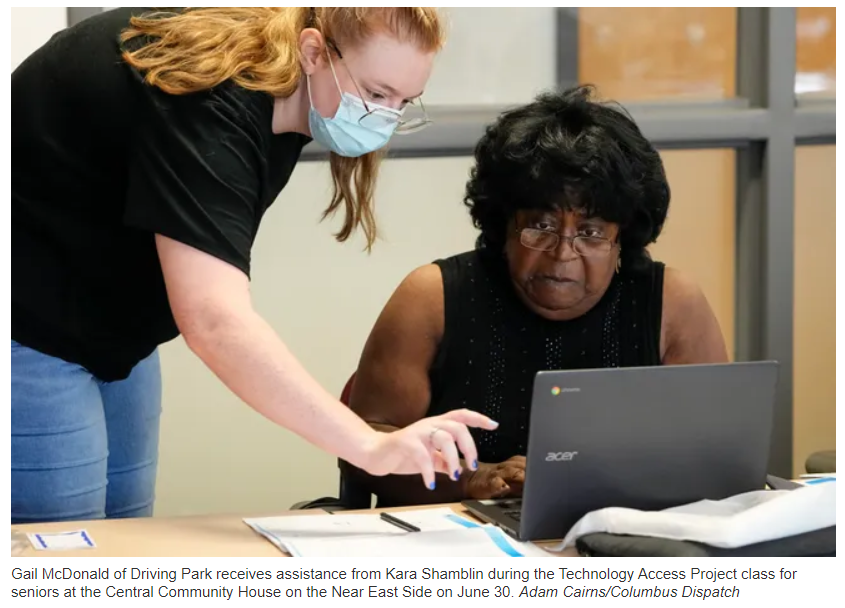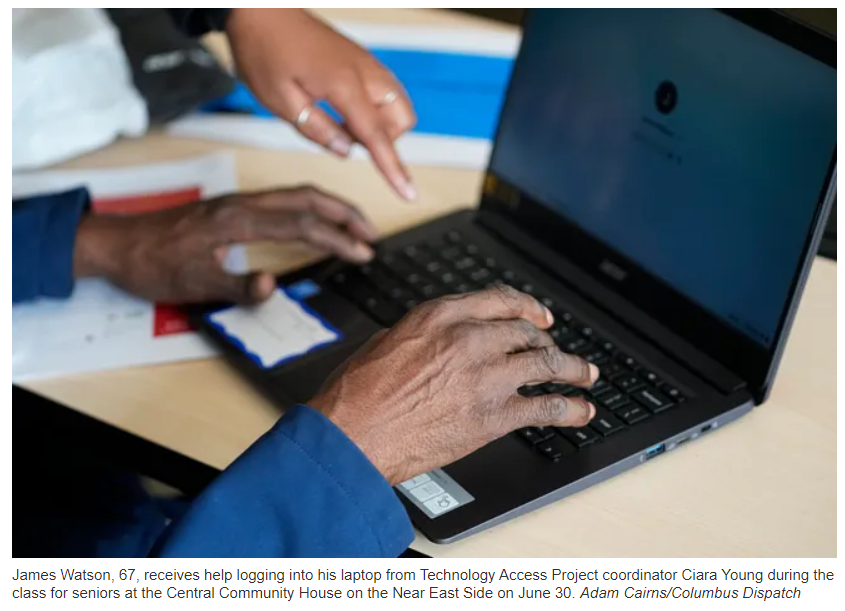'A whole new world' Free computer classes help older Franklin County adults gain knowledge
Bonita Leslie-Pegram was getting ahead of the instructor.
The 72-year-old Driving Park resident asked a question three slides ahead of where instructor Ciara Young was in the class.
“Ms. Bonita, you’re just so eager,” Young said, with a smile.
A few moments later, when Young was starting to explain to the attendees how to mute and stop video on Google Meet, she glanced at Leslie-Pegram’s screen and exclaimed, “Ms. Bonita already found it!”
It was a recent Friday morning and six participants were at the Central Community House for their final class of the free Technology Assistance Project (TAP).
TAP is a series of four classes for Franklin County residents ages 60 and over. During the classes, they are taught how to use a laptop, which they can keep once they have completed the course.
When Young was explaining internet tabs to the group, she said internet browsers are like binders, and the tabs are like tabs used to separate the papers within a binder.
“This is where it gets interesting,” Leslie-Pegram remarked. “Your brain starts churning for real.”
An overwhelming success
The program, which has served 224 people, is funded by multiple sources. The Franklin County Office on Aging invested $305,000 in the program this year, said Tamar Forrest, executive director of the Central Community House, a nonprofit community center on the East Side. And Spectrum provided a $20,000 grant in April for the program.
The program started two years ago, in the midst of the COVID-19 pandemic, when a funder suggested the settlement house offer the classes, Forrest said.
“We never expected this,” Forrest said of the program’s popularity. “Overwhelmingly, it was a success with the senior population.”
She thinks the success is due to the fact that the program connects learning with access to fun activities. For instance, many seniors lost social connections during the pandemic, and the class allows them to learn how to read online and use email, video chat and more.
Now, the program has a waitlist, largely due to word of mouth, Forrest said.
Those interested can contact the nonprofit at (614) 252-3157 or stop by its 1150 E. Main St. location to learn more.
How does the Technology Assistance Project work?
The project was one-on-one classes during COVID and has grown to accommodate multiple students who work with two instructors.
It starts with foundational learning, Forrest said.
“The thing we’ve found is most important is patience and flexibility,” she said. “Everyone is going to be on a different level.”
In the latest class, Young led participants through a review of the prior three classes before launching into the day’s learning.
She quizzed participants on how to turn the volume up and down on their devices, and what keys lead to what commands. Then, she began teaching them how to use Google Meet for video calls, and how to open and type in a Google document and change fonts and text sizes.
After the four classes, participants can come back for weekly tech cafes where instructors will help them with specific questions. They can also retake any or all of the four classes whenever they want.
Forrest has seen the program be life-changing for participants, who, afterward, begin to do their banking online, order groceries, enroll their grandchildren in daycare, talk with family and friends virtually and more.
Some of the reactions Forrest has heard from participants include:
“‘Oh my God, I can relate to my grandkid now,’ and ‘Wow, I never thought I would be able to do this,’ and ‘You’ve opened up a whole new world for me.'"
A survey showed that 95% of seniors involved in TAP have increased their technology skill sets, and 93% say TAP has helped them combat isolation, Forrest said.
Leslie-Pegram enjoys the classroom environment and learning from the questions her peers have, as well as the instructor.
“You learn more through mistakes,” she said.
She feels like she understands the language of computers now. Previously, she wouldn’t get on the internet often as she wasn’t sure what to do once she got there.
Now, she can send emails, search the internet and more. She plans to use her new computer to budget out her home projects, which she has found is easier to do with a computer.
The participants build relationships with their classmates, too, and become comfortable asking questions, Forrest said.
“It’s just about feeling less alone and being able to do more on one's own, not relying on others to help them access critical resources and to stay connected with family," she said.
And the program allows participants to get instant gratification from figuring out how to do different tasks.
“It’s really empowering,” Forrest said.
Article written by: dking@dispatch.com
@DanaeKing





